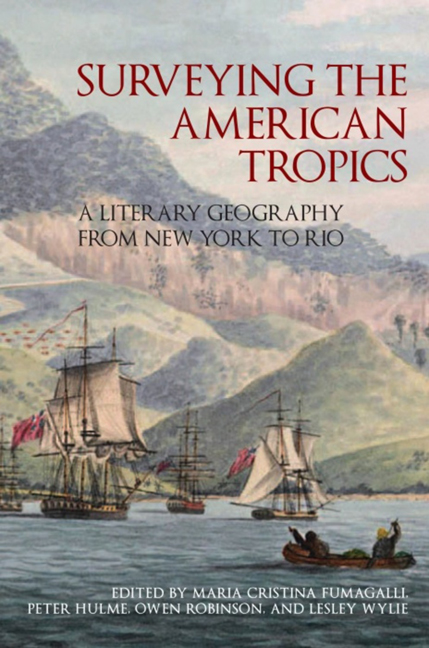Book contents
- Frontmatter
- Dedication
- Contents
- List of illustration
- Introduction
- A Tree Grows in Bajan Brooklyn: Writing Caribbean New York
- Reading the Novum World: The Literary Geography of Science Fiction in Junot Díaz's The Brief Wondrous Life of Oscar Wao
- Inventing Tropicality: Writing Fever, Writing Trauma in Leslie Marmon Silko's Almanac of the Dead and Gardens in the Dunes
- Imperial Archaeology: The American Isthmus as Contested Scientific Contact Zone
- Space Age Tropics
- Black Jacobins and New World Mediterraneans
- The Oloffson
- Dark Thresholds in Trinidad: Regarding the Colonial House
- Micronations of the Caribbean
- Golden Kings, Cocaine Lords, and the Madness of El Dorado: Guayana as Native and Colonial Imaginary
- Suriname Literary Geography: The Changing Same
- The Art of Observation: Race and Landscape in A Journey in Brazil
- Notes on Contributors and Editors
- Index
Golden Kings, Cocaine Lords, and the Madness of El Dorado: Guayana as Native and Colonial Imaginary
- Frontmatter
- Dedication
- Contents
- List of illustration
- Introduction
- A Tree Grows in Bajan Brooklyn: Writing Caribbean New York
- Reading the Novum World: The Literary Geography of Science Fiction in Junot Díaz's The Brief Wondrous Life of Oscar Wao
- Inventing Tropicality: Writing Fever, Writing Trauma in Leslie Marmon Silko's Almanac of the Dead and Gardens in the Dunes
- Imperial Archaeology: The American Isthmus as Contested Scientific Contact Zone
- Space Age Tropics
- Black Jacobins and New World Mediterraneans
- The Oloffson
- Dark Thresholds in Trinidad: Regarding the Colonial House
- Micronations of the Caribbean
- Golden Kings, Cocaine Lords, and the Madness of El Dorado: Guayana as Native and Colonial Imaginary
- Suriname Literary Geography: The Changing Same
- The Art of Observation: Race and Landscape in A Journey in Brazil
- Notes on Contributors and Editors
- Index
Summary
This essay explores the idea of Guayana as a space of cultural imagination for the American Tropics. The notion of ‘exploration’ is perhaps particularly apposite here as ‘Guayana’ defies any stable physical delimitation. The national societies of the Guayana region—Brazil, the Guianas, and Venezuela—quite overtly construct themselves through a contrast between the historically settled coasts and a still-unexplored or unconquered interior. The fluvial border created by the connection of the Amazon, Orinoco, and Rio Negro rivers thereby constitutes the frontier between the imagined space of Guayana and the historically constituted space of national and post-colonial identity. In the contemporary era all kinds of development projects, national parks and forest preserves, police or military actions in this space can partly be understood as a sign of the emplacement of national societies in the as yet wild and alien landscapes of the ‘interior’. Historically, for both the colonial and national imaginaries of this region of north-eastern South America, the notion of ‘Guayana’ signals both numerous dangers and obstacles, but also wonders and marvels, to those who travel within its conceptual and physical spaces. As the Venezuelan proverb puts it: Quien se va al Orinoco, si no muere, se vuelve loco.
Nor can this imaginative reputation be simply reduced to a case of European or non-native credulity and confusion in a strange land, since the marvellous and dangerous are present for Amerindian explorers and adventurers no less than European ones. Both ritually and cosmologically, the space of Guayana represents for native peoples a zone of distinct ritual and cultural practice, the site of ancient routes by which sacred knowledge was spread by the first people and the site where the great earth tree, from which all plants and animals sprouted, once stood. In the highlands at the core of Guayana can still be seen the stump of this first tree, petrified into one of the tepuis that rise from the forest, the site of Conan Doyle's ‘Lost World’. As the Ye'cuana tell us in their creation myth, the Watunna, in Weyana, under one of those tepuis, all the good people of the world are still waiting to be born, and will wait until they are shamanically discovered and ritually released.
- Type
- Chapter
- Information
- Surveying the American TropicsA Literary Geography from New York to Rio, pp. 263 - 284Publisher: Liverpool University PressPrint publication year: 2013



